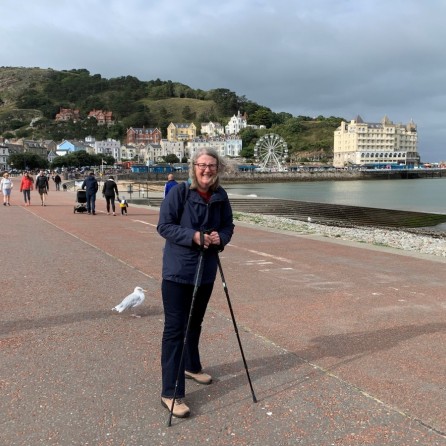Today is a good day. I have many good days. Many, many more than I did before starting Overcoming MS. Like other people with long-term progressive MS (in my case 33 years), I also have some bad days. I have recently reached a new level of acceptance about its impact on my life despite following Overcoming MS and I’d like to share that with you.
Having embraced Overcoming MS, I am so much better than I could possibly have hoped for when I was diagnosed back in 1989. But I have some residual symptoms, and…there’s no other word for it…some disability. There have been no drugs suitable for me, and my MS progressed significantly for more than twenty years before I adopted the Overcomoing MS Program and started making improvements. I am still walking unaided for ‘normal activities’ such as shopping in town, but I do use walking poles if I go for a longer walk, say of 2km. Losing the brain fog (another positive benefit of the Overcoming MS Program) has been amazing, clarity of thought is so reassuring. I still notice positive changes from time to time, having been ‘stable’ for a few years now with no changes seen on MRI scans.
I have found that Overcoming MS works, even if started later in life or a long time after a diagnosis. It’s brilliant to see people whose MS does not progress living full ‘normal’ lives with work and families. But there are also a few of us following OMS who are living with some disability whilst improving and stabilising, showing no evidence of disease activity and enjoying robust general health. We still aspire to improve and will ‘do what we can’ to overcome whatever MS throws our way but are on a different journey.
So, if you see someone in a wheelchair or using a stick while following OMS, please don’t think that the program is failing somehow. We all start from a different place. But Overcoming MS is an inclusive program and the Overcoming MS charity is an open and accepting organisation that helps each of us to live well with MS wherever we begin.
Those lucky enough to adopt the Program from the point of diagnosis do very well indeed. I know people who regularly join a park run or walk miles in the countryside despite having had MS for ten years. I have to remind myself that I had MS for nearly a quarter of a century before I discovered the Overcoming MS Program, whereas they started the program when diagnosed. They were lucky and had friends who told them about it or used Google to search for MS and lifestyle changes.
When I was diagnosed with MS in 1989, the internet wasn’t widely known; the worldwide web wouldn’t have public websites available for another five years. We relied on medical professionals and books for limited amounts of information. If someone had told me then that I’d be on a video call one day with people across four countries, discussing the Overcoming MS Program and lifestyle changes to help my MS, I’d have thought I was dreaming. But that’s exactly what I did recently. One of the great things about the Overcoming MS community, and the global nature of the charity, is that we can meet and share our diverse experiences, tips, and ideas using technology that brings us all together across different time zones.
So, please enjoy the benefits of the Program whatever your starting point. Every small improvement is a step in the right direction!
